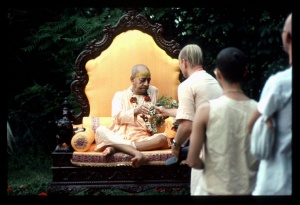SB 4.27.15

A.C. Bhaktivedanta Swami Prabhupada
TEXT 15
- te caṇḍavegānucarāḥ
- purañjana-puraṁ yadā
- hartum ārebhire tatra
- pratyaṣedhat prajāgaraḥ
SYNONYMS
te — all of them; caṇḍavega — of Caṇḍavega; anucarāḥ — followers; purañjana — of King Purañjana; puram — city; yadā — when; hartum — to plunder; ārebhire — began; tatra — there; pratyaṣedhat — defended; prajāgaraḥ — the big serpent.
TRANSLATION
When King Gandharva-rāja [Caṇḍavega] and his followers began to plunder the city of Purañjana, a snake with five hoods began to defend the city.
PURPORT
When one is sleeping, the life air remains active in different dreams. The five hoods of the snake indicate that the life air is surrounded by five kinds of air, known as prāṇa, apāna, vyāna, udāna and samāna. When the body is inactive, the prāṇa, or the life air, is active. Up to the age of fifty one can actively work for sense gratification, but after the fiftieth year one's energy decreases, although one can with great strain work for two or three more years—perhaps up to the fifty-fifth year. Thus the fifty-fifth year is generally taken by government regulations as the final year for retirement. The energy, which is fatigued after fifty years, is figuratively described herein as a serpent with five hoods.